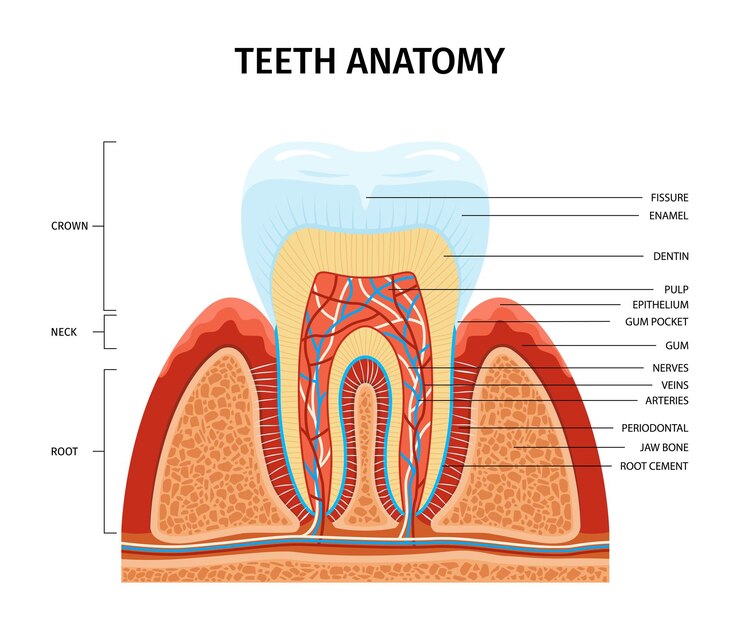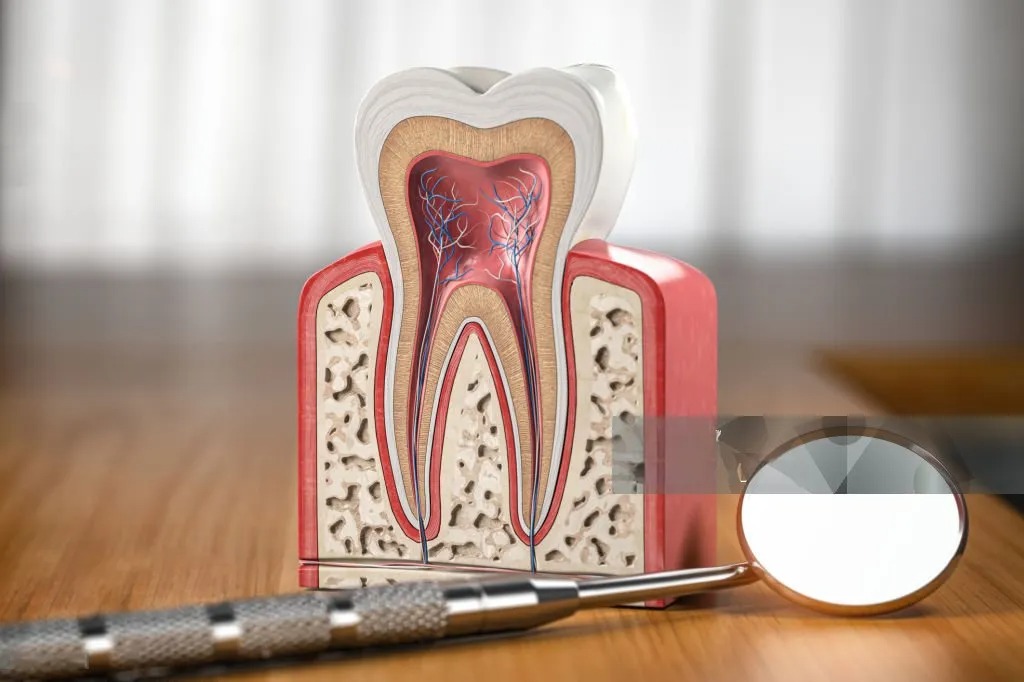Teeth are a vital part of our body, not only for chewing but also for helping us speak clearly and shaping the appearance of our faces. Each tooth is made up of several layers and types, each playing a specific role in ensuring we can properly bite, chew, and maintain overall oral health. By understanding the anatomy of human teeth, you can recognize their function and learn how to take better care of them.
Basic Structure of Teeth
Your teeth may look simple on the surface, but they are made of several layers that perform essential functions. Each layer is designed to help your teeth stay strong and functional. The main components of a tooth include:
- Enamel: The hardest substance in the human body, enamel forms the outer layer of the tooth. Its primary function is to protect the softer parts of the tooth from damage caused by chewing, acidic foods, and drinks.
- Dentin: This layer is located just under the enamel and forms the bulk of the tooth. Dentin is softer than enamel and contains microscopic tubes that lead to the tooth’s pulp. If enamel wears down, these tubes can become exposed, causing tooth sensitivity.
- Pulp: The innermost part of the tooth, the pulp contains nerves and blood vessels. The pulp supplies nutrients to the tooth, and any damage to this area can cause significant pain and may require action, such as a root canal.
- Cementum: This is a thin layer of calcified tissue that covers the tooth’s root and helps anchor it within the jawbone.
- Periodontal Ligament: This ligament is made of connective tissue and holds the tooth tightly in the socket, absorbing shock from chewing and biting.
The Anatomy of the Human Teeth

There are several types of teeth in the mouth, each with its own specific function. Understanding the role of each type will help you appreciate how your teeth work together to maintain a healthy bite and assist in digestion.
- Incisors: These are the front teeth on the upper and lower jaws. They are flat and sharp, designed for cutting food into smaller, manageable pieces.
- Canines: Also known as cuspids, these pointed teeth are located next to the incisors and are responsible for tearing food.
- Premolars: These teeth, located behind the canines, are larger and flatter with ridges. Their primary function is to crush and grind food.
- Molars: The largest teeth in the back of the mouth, molars have a broad surface area, allowing them to effectively grind and chew food.
Each tooth plays a unique role in the digestion process and helps maintain a healthy bite and proper jaw alignment. Proper care is essential to preserve their function and longevity.
Why Oral Health Matters
Maintaining health for teeth is essential for your overall health. Your teeth are connected to the rest of your body, so neglecting oral care can lead to more serious health issues. Practicing proper dental hygiene is critical for preventing problems such as tooth decay and gum disease.
- Brushing your teeth twice a day with fluoride toothpaste helps remove plaque and prevent cavities.
- Flossing regularly ensures that food particles and plaque are removed from areas between the teeth that your toothbrush cannot reach.
- Regular dental check-ups help detect and treat problems early, preventing more severe conditions.
Poor oral hygiene not only leads to dental issues but can also contribute to systemic health problems. For example, bacteria from infected gums can enter the bloodstream and lead to heart disease or other complications. Taking preventive measures is crucial for both oral and overall health.
Caring for Your Teeth: Tips for Oral Health
To keep your teeth healthy and strong, follow these essential tips:
- Limit Sugary Foods and Drinks: Sugar can negatively impact your oral health. It is a favourite feeding substance of the bacteria in the mouth that produces acid that can attack the teeth’ enamel.
- Drink Lots of Water: This passive approach cleans the teeth. Drinking a lot of water removes food debris and bacteria. It lowers the risk of dental caries.
- Mouthwash: An antibacterial mouthwash helps in combating the growth of plaque, which promotes oral cavity diseases.
- Make Appointments with Your Dentist: This last option remains the most aggressive as it deals with the problems when most if not all, have been identified and dealt with at an earlier stage.
By following these tips, you can ensure that your teeth remain strong and healthy for years to come.
The Importance of Regular Dental Visits
Routine dental visits are critical to maintaining good oral health and preventing future issues. By seeing dentist near you regularly, you can catch early signs of tooth decay, gum disease, or other dental problems before they become serious. Whether you need a cleaning, a check-up, or more advanced dental treatment, having a reliable dentist you can visit consistently is essential.
- Experience and Expertise: Choose a dentist in Etobicoke who has a proven track record of success in handling various dental procedures.
- Range of Services: Ensure the dentist offers the services you need, from preventative care to advanced treatments.
- Location: It’s important to select a dentist near you for convenience, especially for regular visits or in case of a dental emergency.
- Patient Reviews: Look for feedback from other patients to gauge the quality of care and service provided by the clinic.
Choosing a reliable dentist is essential for preventing major dental issues and ensuring your oral health is in good hands.
Trust Kailash Dentist for Your Dental Care
Understanding the anatomy of the human teeth and maintaining proper oral hygiene is essential for long-term dental health. At Kailash Dentistry, we prioritize your dental well-being by offering professional, comprehensive care. Whether you need a routine check-up or advanced dental treatment, our team is dedicated to keeping your smile healthy. If you’re looking for a dental clinic in Etobicoke, visit us at Queensway for expert care tailored to your needs. Call us today and make an appointment to make sure that your teeth are healthy and strong forever!


